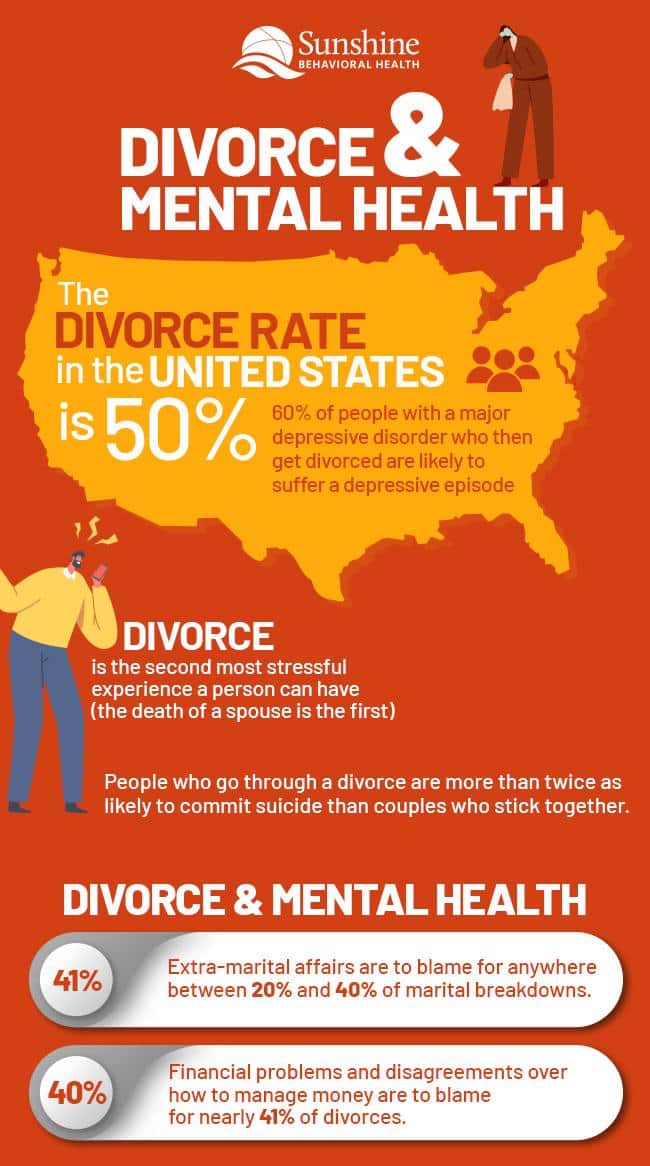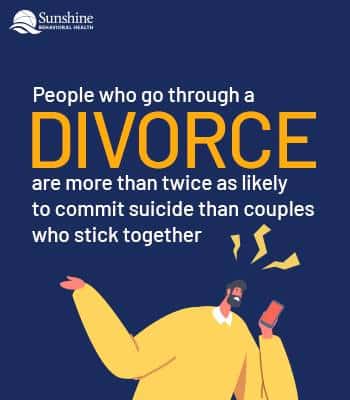Marriage is meant to last a lifetime. Sadly, things don’t always play out as expected. The divorce rate in the United States stands at 50% and the rate climbs higher for subsequent marriages.
The split can put a strain on mental health, leading to problems such as stress, anxiety, and depression. Thankfully, there are ways to overcome divorce-related mental health issues and go on to lead a happy, fulfilled life.
Can Divorce-Related Stress Be Prevented?
Almost all the most common causes for divorce are stressful in nature. These are:
- Infidelity. Extra-marital affairs are to blame for anywhere between 20% and 40% of marital breakdowns.
- Money problems. Financial problems and disagreements over how to manage money are to blame for nearly 41% of divorces.
- Trauma. The sudden death of a family member, loss of a job or home, and/or other forms of trauma cause many couples to call it quits. The COVID-19 pandemic and lockdowns, for instance, have either proven to be the last straw for many marriages or have led to couples who were previously happy together splitting up.
- Addiction. The National Center for Drug Abuse Statistics notes that nearly 61% of Americans over the age of 12 abuse drugs, alcohol, and/or cigarettes. Combating an addiction can actually make a marriage stronger if both partners are willing to work together to overcome substance use disorder; however, it can take years for an addict to successfully overcome an addiction. In many cases, a spouse simply cannot handle a stressful and often dangerous environment that an addiction naturally brings about.
At the same time, even a fairly straightforward divorce is almost certain to cause some level of stress and anxiety. The change from being together with someone to living alone is not easy. This is especially true if you need to move to a new house, find a new job, and/or decide if you want to further your studies. Unmet expectations, which often cause divorces based on compatibility issues, can lead to guilt, anger, resentment, or other unhealthy emotions.
If you have children, they may be anxious and upset. They may wonder if they’re to blame for the divorce. They may act up to get your attention. Children may be particularly upset if a divorce results in a move or other unwelcome changes to their routine. This can lead to further mental health issues as you have to not only deal with your own feelings but also theirs.
Put simply, one may not be able to avoid at least some mental health issues in a divorce. However, the severity of your symptoms and how long they last depend on a myriad of factors. Thankfully, there are things that can be done to prevent stress or deal with it as soon as it starts to avoid long-term mental health issues.

Mental Health Warning Signs
There are tried and proven ways to improve mental health on your own. However, it’s very important to know warning signs that indicate you may need professional help. These include:
- Suicidal thoughts. People who go through a divorce are more than twice as likely to commit suicide than couples who stick together. Divorced men are more vulnerable than women; for every woman who commits suicide due to a divorce, nine men do the same. If you feel like ending your life, get immediate help from a professional.
- Eating disorders. If you don’t feel like eating and your weight is dropping to an unhealthy level, you may wish to seek out professional help before your lack of nutrition leads to serious, long-term physical health problems. At the same time, those who turn to comfort food and put on weight as a response to stress and anxiety may need the help of a medical expert to shed unwanted pounds and thus avoid serious health problems linked with obesity.
- Existing mental health issues. If you have existing mental health issues such as depression, anxiety, or bipolar disorder, get immediate professional help if you’re planning on getting a divorce. One study found 60% of people with a major depressive disorder who then get divorced are likely to suffer a depressive episode. Thankfully, a long-term mental health battle isn’t necessarily inevitable in the wake of a divorce. A counselor or mental health professional can help steer common pitfalls and lessen the stress and anxiety linked to divorce proceedings.
- Abuse. If you’ve suffered any form of abuse during your marriage, get immediate professional help before you get a divorce. A lawyer can help you protect yourself while enabling you to claim what is rightfully yours. A counselor/therapist can help you overcome past abuse to lead a healthy, productive life. Non-profit agencies and government organizations can often connect you with those who can best help you finalize a divorce without undue hassle or pain.
Mental Health During and After a Divorce
Divorce is one of life’s major sources of stress. A strong support network and a dedication to self-care are just two ways to better navigate a difficult time.
Get Support
If you need professional help during a divorce, it is usually better to seek it out as soon as you can. At the same time, even those who don’t need professional help may benefit from support from friends, family members, and/or divorce support groups.
Many people tend to shut themselves off from others in the wake of a divorce. There are many reasons for this, including shame, guilt, embarrassment, or loss of social standing.
Granted, you’ll want to spend some time alone processing your thoughts, researching your options, and making decisions. However, it’s unhealthy to shut yourself off from social contact. Connect with people regularly; in-person contact is ideal, but even virtual connections can make a huge, positive difference.
Strong friendships alleviate stress, boost optimism, and even strengthen your immune system. The latter point is important as physical health issues can take a toll on your mental health if you’re going through a stressful time.
At the same time, choose your friends with care. Long-term friends who know you well can offer both a listening ear and practical help. If you don’t have people you feel you can confide in, reach out to a support group. Those who have experienced divorce first-hand understand the pain and strain it brings and can offer the tools and tips one needs to overcome mental health issues related to divorce.
Counseling or therapy may be solid options, too.
Make Time for Fun and Relaxation
You need time to unwind and enjoy yourself. Thankfully, you don’t need a lot (or even any) extra money to kick back and enjoy life. Some healthy forms of fun to consider include:
- Start a new hobby you’ve always wanted to try. Paint, color, knit, crochet, garden, take up karate, build model airplanes, or what have you. There are so many options to pick from that it’s almost impossible not to find one to like.
- Engage in activities that help you make new friends. Hang out at the neighborhood park, join a support group, or reach out to new people in the course of your day.
- Volunteer. Believe it or not, volunteering reduces stress levels, gives a sense of purpose, lowers the risk of depression, and helps you make new friends and build new relationships.
- Make time for activities you enjoy. Watch your favorite movies or TV shows. Consider a book you’ve always wanted to read.
Eat and Drink Right
Maintain (or start) a healthy eating plan. Eating healthy foods helps to alleviate stress while enabling you to stay healthy and fit physically. Physical health impacts mental health, so doing everything you can to prevent physical sickness is important when undergoing mentally stressful circumstances.
What does a healthy diet look like? Put simply, eat lots of fruits and vegetables, enough protein (vegetarian and non-vegetarian options are suitable), and healthy carbohydrates such as whole-wheat bread, brown rice, and potatoes. Avoid soft drinks and junk food. Drinking at least eight cups of water a day can prevent dehydration that typically leads to headaches, confusion, irritability, cramps, and/or fatigue.
Exercise
Physical exercise is also a great stress reliever. Choose a form of exercise that you enjoy and make time for it at least three times a week. Yoga, swimming, jogging, running, weight lifting, and other forms of exercise are all good options. You can exercise outside, in the comfort of your own home, or at a local gym.
If you haven’t exercised in some time and/or have physical health problems, start slow and build up your resistance and strength. It may also be a good idea to talk to your doctor about your new exercise regimen before you start.
Set Goals for Yourself
Setting goals for yourself will give you the feeling of being in control. It boosts optimism and hope for the future.
It can be hard to see what the future could look like when in the middle of a messy divorce. That’s why it’s important to stick to goals that are realistic and attainable.
For instance, you could make it your goal to work out for one hour a day, five days a week, for the next month. You could give yourself a deadline to learn the basics of a new skill. Long-term goals related to where you want to be and what you want to be doing in the next five or 10 years are also essential as they help you keep a long-term vision for your life.
Steer Clear of Addiction
It may sometimes be tempting to turn to alcohol and/or drugs to alleviate stress, anger, depression, and other negative feelings. A better coping mechanism is advised, such as the aforementioned support systems or seeking out a new hobby. Addictions can spiral out of control quickly, and the health and legal repercussions can be steep.
Furthermore, children who grow up with an addicted parent are eight times more likely to become addicts compared to children who grow up in an addiction-free household.
Who to Turn to for Help and Advice
 Anxiety and Depression Association of America
Anxiety and Depression Association of America
The Anxiety and Depression Association of America (ADAA) offers practical help and advice to help you deal with the depression, anxiety, and stress that often is an inevitable part of divorce proceedings. This non-profit association has been in operation for more than 40 years and provides free educational resources, support groups, webinars, and assistance finding a local therapist who can provide you with the personalized advice you need to restore your mental health and well-being after a difficult separation.
The Center for Mediation and Training
The Center for Mediation and Training educates professional mediators; to this end, it offers up to eight free mediation sessions either in-person or online. All training sessions are hosted by two advanced trainees supervised by the institute’s training directors to ensure the best possible outcome.
Mediation can take the anger and stress out of what could potentially be a messy divorce. You and your soon-to-be-ex will have the opportunity to talk about thorny issues such as division of assets, child custody, alimony, and a host of other topics. Once you come to solutions you both agree on, lawyers can draw up the paperwork to make the agreements final.
What’s more, divorce mediation isn’t just for those undergoing a divorce. The center offers mediation services for those who have already finalized divorce proceedings. Mediation sessions for recent divorcees can help both parties work through existing issues, promoting healing and closure in a way that formal courtroom proceedings will never be able to match.
National Alliance on Mental Illness
The National Alliance on Mental Illness (NAMI) offers practical help for anyone dealing with mental health issues in the wake of a divorce. The organization’s site provides practical tips, free educational resources, support groups, a helpline, a free video resource library, and more. You can sort topics by various criteria, including exact mental health conditions, ethnicity, and sexual orientation.
National Suicide Prevention Lifeline
The National Suicide Prevention Lifeline provides free and confidential support to anyone who is considering ending his or her own life. You can call at any time of the day or night for professional, personalized help that will give you the courage you need to conquer the obstacles you face. The site also offers help finding a therapist or support group in your local area as well as helpful tips on how to help yourself avoid pitfalls that could lead to suicidal thoughts.
There is Life After Divorce
Divorce is difficult for people of all ages and all walks of life. It’s the end of stage of life and the start of another, and the transition process is often fraught with problems and challenges.
Experts advise treating yourself gently when dealing with stress, anxiety, and/or depression in the wake of a divorce. Take care of yourself physically and mentally, and get professional help and support if it’s warranted or wanted.
Sources
Medical disclaimer:
Sunshine Behavioral Health strives to help people who are facing substance abuse, addiction, mental health disorders, or a combination of these conditions. It does this by providing compassionate care and evidence-based content that addresses health, treatment, and recovery.
Licensed medical professionals review material we publish on our site. The material is not a substitute for qualified medical diagnoses, treatment, or advice. It should not be used to replace the suggestions of your personal physician or other health care professionals.







